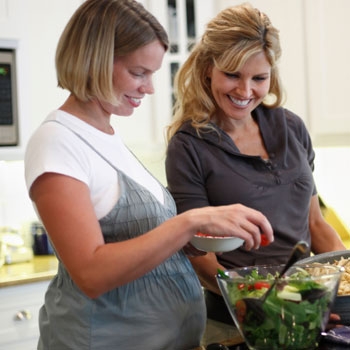Fit for Two: Best Pregnancy Foods

Studies show that your diet can affect your baby’s health. In fact, the link between what you eat and the health of your baby is stronger than once thought. While pregnant, you should consider not only how much you eat, but also what you eat. Pregnant women generally need about 300 extra calories a day. Those calories should come from healthy and vitamin-rich foods that will help contribute to your baby’s growth and development.
One of the main nutrients that pregnant women need is folic acid, which has been proven to help prevent neural tube defects. Folic acid can be found in leafy greens, beans, nuts, and fortified breakfast cereals and breads.
Expectant mothers should also be sure to get at least three servings of calcium each day. Calcium helps build strong bones and teeth. It also helps with nerve function. Rich sources of calcium include milk, cheese, yogurt, salmon and spinach.
Protein, which is found in meats, poultry, fish, eggs, tofu and beans, helps with cell growth and blood production. And don’t overlook carbohydrates, which will help keep your energy levels up while pregnant.
Look for healthy and whole-grain varieties such as breads, cereals, pastas, fruits and potatoes. Iron, which is found in red meat, spinach, and whole-grain breads and cereals, will help prevent anemia and aid in red blood cell production.
And eating at least seven servings of fruits and vegetables daily will help ensure that expectant mothers and babies will get enough vitamin A and C — which will help with skin, eyesight, bones and teeth.
Even though a healthy diet can be achieved through all these foods alone, doctors do recommend expectant mothers take prenatal vitamins while pregnant. This ensures they will get all the important nutrients they and their babies need each day.
Some women may experience constipation while pregnant, especially if they are sensitive to iron in their vitamins. To help fight constipation, pregnant women should make sure they consume at least 20-30 grams of fiber each day. The best sources are fruits and vegetables, whole grains, and potatoes. And be sure to drink plenty of water.
Pregnant women who are plagued by morning sickness and nausea can try eating small amounts of food every couple of hours. This will help keep you full because oftentimes, an empty stomach can make nausea worse.
Sucking on small pieces of hard candy can also help. Some women believe citrus helps whether by eating an orange or squirting some lemon juice into their beverage. Teas or foods that contain ginger also help curb nausea.
The key to a healthy pregnancy is to eat healthy foods from all the food groups. Avoid eating a lot of processed foods, which are generally full of empty calories and devoid of nutrients. This will help ensure a healthy pregnancy and healthy baby.

